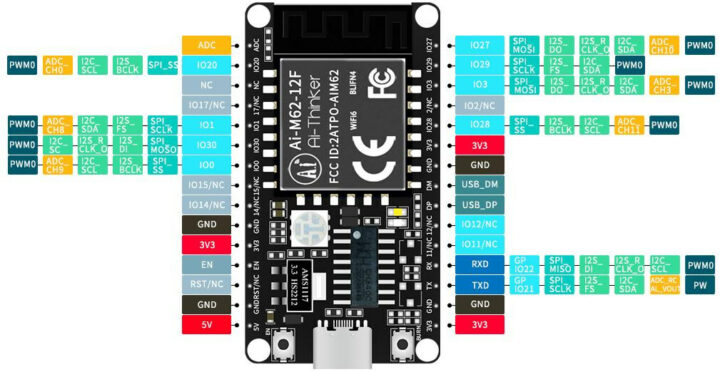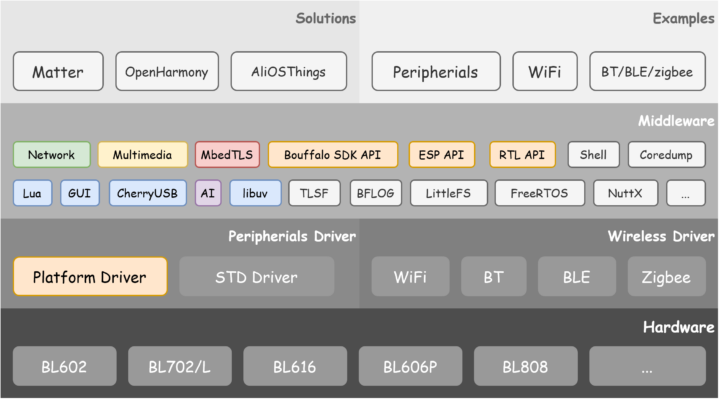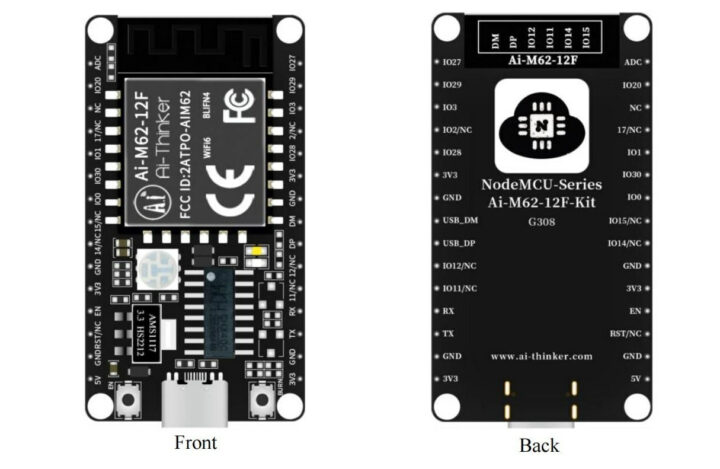Ai Thinker Ai-M62-12F-Kit is a development board based on Bouffalo Lab BL616 RISC-V microcontroller with 2.4 GHz WiFi 6, Bluetooth 5.2 LE, and an 802.15.4 radio (Zigbee/Thread), plus thirty I/O pin for expansion.
We had already covered the tiny Sipeed M0S module based on BL616 MCU earlier this year along with its M0S dock board that exposed eight GPIO pins via a 12-pin header, and the “NodeMCU” Ai-M62-12F basically offers the same features but with many more I/Os thanks to two 15-pin headers, as well as an RGB LED and two user-programmable LEDs.
Ai-M62-12F-Kit specifications:
- MCU – Bouffalo Lab BL616 32-bit RISC-V (RV32IMAFCP) microcontroller @ up to 320 MHz (384 MHz overclocked) with 480KB SRAM, 4MB flash, 2.4 GHz WiFi 6, Bluetooth 5.2 dual mode, and 802.15.4 radio (Zigbee)
- Antenna – PCB antenna
- USB – 1x USB Type-C port for power and programming
- I/Os – 2x 15-pin headers with
- Storage – SD/MMC(SDH)
- Audio – I2S
- USB – USB 2.0 OTG up to 480 Mbps
- I2C, UART, SPI, PWM
- Analog – GPDAC, GPADC, ACOM
- Up to 16x GPIOs
- 5V, 3.3V, and GND
- Security – WPS, WEP, WPA, WPA2, WPA3
- Misc – Reset (EN) and BURN buttons, RGB LED, 2x user LEDs
- Supply Voltage
- 5V via USB-C port (recommended) or 5V pin header
- 3.3V via 3.3V pin header
- Current >= 500 mA
- Dimensions – 49.66 x 25.40 mm
- Temperature Range
- Operating: -40 to +85°C
- Storage: -40 to +125°C, < 90% RH

Ai Thinker offers some documentation for the NodeMCU Ai-M62-12F-Kit board and corresponding Ai-M62-12F module, as well as other BL616 modules and devkit with different form factors including Ai–M62-13-Kit, Ai–M62-32S-Kit, and the Ai–M62-M2-I-Kit, while linking to the “aithinker_Ai-M6X_SDK” Bouffalo SDK on GitHub for software support and code samples.
If the information on GitHub is up-to-date, the SDK currently only supports WiFi 6 and Bluetooth Low Energy for the BL616 microcontroller, but not Bluetooth Classic and Zigbee just yet. All peripherals appear to be supported.

Note that the Bouffalo BL616 competes directly against the ESP32-C6 WiFi 6, BLE, and Zigbee microcontroller with Espressif launching modules and devkits officially at the beginning of the year, and some third-party ESP32-C6 board showing up in April.
Bouffalo Lab and Ai Thinker have been quite aggressive on pricing as the Ai-M62-12F-Kit development board currently sells for $4.94 plus shipping ($6.81 in total to Thailand), and equivalent ESP32-C6 boards go for $7.74 plus shipping ($11.84 in total here)
Thanks to Chris for the tip.

Jean-Luc started CNX Software in 2010 as a part-time endeavor, before quitting his job as a software engineering manager, and starting to write daily news, and reviews full time later in 2011.
Support CNX Software! Donate via cryptocurrencies, become a Patron on Patreon, or purchase goods on Amazon or Aliexpress. We also use affiliate links in articles to earn commissions if you make a purchase after clicking on those links.






insane EU shipping for ESP32-C 6 🙁
The documentation on AliExpress listing suggests this actually supports BLE5.3, where LC3 codec was first introduced, making it one of the first SoCs to support this new standard, significantly improving attractiveness of the device.
The “attractiveness of the device” only depends on the quality of the software support.
The ESP’s from espressif aren’t attractive because they are state-of-the-art or include bleeding edge stuff but just because they have a superior software support.
Many device perform much better on paper (specs) but because of mediocre software support and lacking documentation they almost never can compete with espressif devices…
The documentation part sure play an important role, but I think as well as the technical support services by the supply. A single standard should not be used to judge whether a product is good or bad. The software support power currently may toward to the big company, somewhat similar to Realtek
Documents and materials can reflect the maturity and completeness of a product, but corresponding technical support and technical services as well as online processing capabilities can also improve competitiveness. Optimistic about the future development of this product
Yet another development BL board without JTAG pins routed and without full documentation available (while ESP32-C3 has JTAG builtin into the USB)… Specs are nice, usability not so much